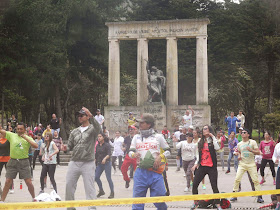 |
| A wreath and a plaque this afternoon on Carrera 7 beside Congress mark the spot where Rafael Uribe was assassinated 100 years ago today. |
 |
| Rafael Uribe, portrait by Francisco Cano. |
Uribe also fought for the Liberals in the 1895 civil war, which the Liberals lost.
He fought again in the 1899 civil war, which the Liberals lost.
And Uribe helped lead the Liberal side in the Thousand Day War of 1899-1902, which the Liberals also lost.
Uribe later entered Congress, but his often radically-leftist ideas were ahead of his time - and in the wrong place - and went nowhere.
 |
| Forgotten figure? Practicing aerobics during La Ciclovia in front of Uribe Uribe's monument in Bogotá's Parque Nacional. |
But despite his repeated defeats and frustrations, Uribe is remembered as a great figure in Colombian history - a refreshing perspective in a nation which generally worships winners.
Uribe was born of a farming family in Antoquia. He went on to study law and work as a professor, journalist and diplomat, as well as a military general and politician. His murder 100 years ago today made him a martyr.
 |
| A plaque beside the Congress says that Uribe was murdered by two 'obscure wrongdoers.' |
If Uribe had lived at another time, when the Liberals were in power, he might have been a great reformer - perhaps a more radical Teddy Roosevelt. Instead, his ideas of land redistribution and aid to small farmers had to wait decades to be realized. Unequal land distribution has been a root cause of Colombia's many civil wars and insurgencies, and perhaps if Uribe's ideas had been implemented Colombia would have saved itself decades of guerrilla violence.
 |
| Pedestrians pass the spot on Carrera 7 between Calles 9 y 10 where Uribe was assassinated in 1914. |
Uribe in popular culture: According to Wikipedia: The character of Colonel Aureliano Buendía in One Hundred Years of Solitude was loosely based on Rafael Uribe Uribe. García Márquez's grandfather fought under Uribe's command in the Thousand Days War.
 |
| Uribe Uribe's confessed killers. |
 |
| A book by Uribe Uribe: 'Liberalism is not a sin.' |
Thanks for this history. You hear his name and just assume (erroneously) that he must have been a former president.
ReplyDeleteI also didn't know that one of Bogotá's districts is named Rafael Uribe Uribe. I wonder if locals say the whole thing-- seems like kind of a mouthful.
ReplyDeleteThanks Vocabat. I'd forgotten to mention the Bogotá district named after Uribe Uribe. I'm sure it's not the only place named after him.
ReplyDeleteI suspect that many people seeing his surname today associate it with ex-Pres. Alvaro Uribe.
Mike
No relation, then?
ReplyDeleteI doubt it, altho Alvaro Uribe did start out as a Liberal.
ReplyDeleteBut Uribe is a common (Basque) surname in Colombia.
Mike